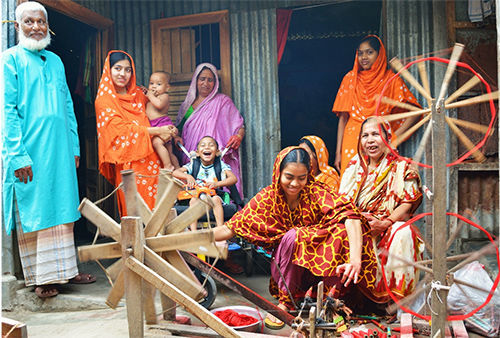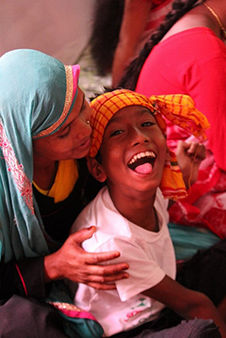Disability & Chronic Disease
Introduction
Childhood disability and chronic disease pose major public health challenges with an estimated 93 million children aged 0-14 years suffering from moderate or severe disability globally. Healthcare provision and the overall quality of life of children with disability are often poor in low and middle income countries (LMICs). Globally 85% of children with disabilities live in LMICs, but only about 5% of these children receive any rehabilitation services.
Recent reductions in under-5 mortality as part of the Millennium Developmental Goals (MDGs), have been accompanied by an increase in childhood disability (e.g. cerebral palsy). Yet research into the needs of this rapidly growing childhood population is insufficient, and the availability of early diagnosis and appropriate intervention remains limited. A comprehensive understanding of the incidence, prevalence, aetiology and prevention strategies (including early diagnosis and intervention) is needed to reduce the global burden of childhood disability.
The “Disability and Chronic Disease” research theme aims to generate high-quality evidence that will inform better policy and practice to support children with disability and chronic disease. Our research program is in line with the United Nation’s Sustainable Development Goals (SDG), and should benefit regional partners by building research capacity, providing a better epidemiological understanding of disability and chronic diseases, and improving the quality of life of affected children by enabling early detection and effective intervention. You are welcome to join our research community.
Theme Leaders
 |  | |
Early Career Researcher Theme Leader
 |
| Tasneem Karim |
| Dr Tasneem Karim is a Research Fellow at the Children’s Hospital Westmead Clinical School and Cerebral Palsy Alliance, The University of Sydney. She recently completed her PhD under the supervision of Professor Nadia Badawi, Professor Gulam Khandaker and Professor Elizabeth Elliott. Her thesis titled Surveillance, early diagnosis and intervention for children with cerebral palsy in low resource settings: Lessons from Bangladesh and Vietnam describes two robust methodologies of data collection on children with cerebral palsy in low resource settings and confirms a substantial burden of cerebral palsy and associated impairments including hip dysplasia, epilepsy, and malnutrition among children with cerebral palsy in Bangladesh and Vietnam. It additionally maps the path towards the establishment and use of national cerebral palsy registers, and describes strategies for early detection and a promising community based early intervention program for children with cerebral palsy and their families in low resource settings. The findings from this research have significant bearing in informing practice, policy and further research in low resource settings globally. This work has been selected for presentation at the prestigious PhD Platform of the Combined 11th Australasia Academy of Cerebral Palsy and Developmental Medicine and the 3rd International Alliance of Academies of Childhood Disabilities Conference ‘BETTER TOGETHER’ (AusACPDM / IAACD 2022). |
|
|  |  |
Exemplar Projects
Bangladesh Cerebral Palsy Register (BCPR): towards developing a national cerebral palsy (CP) register and surveillance of children with CP
BCPR is the first population based surveillance of children with CP in a low and middle income country to facilitate studies on the prevalence, severity, causes, associated impairments and risk factors for cerebral palsy in Bangladesh(1). To date, the BCPR project has collected data on over 1500 children with CP in rural Bangladesh. The data collected will help inform ongoing research and service development in various areas including quality of life, nutritional status(2) and disability, impacts of early diagnosis and intervention programs. BCPR was a World Cerebral Palsy Day Award winner(3) in 2017.
Hospital based-surveillance of cerebral palsy (CP) in Hanoi using the Paediatric Active Enhanced Disease Surveillance mechanism (PAEDS-Vietnam): a study towards developing hospital-based disease surveillance in Vietnam
The epidemiology, pathogenesis, management and outcomes of CP Vietnam are unknown because of the lack of mechanisms for standardised collection of data. In collaboration with National Children’s Hospital, Hanoi and Hanoi Medical University, PAEDS-Vietnam study aims to develop a hospital-based surveillance system to define the aetiology, motor function and its severity, associated impairments, and nutritional and rehabilitation status of children with CP in Hanoi, Vietnam(1). These essential baseline data will inform future health service planning, health professional education and training, and family support.
Improving early detection and intervention for young infants at high risk of neurodevelopmental delay and disability in Uganda
This is a randomised-controlled trial, which aims to evaluate whether a facilitated, community-based, participatory early intervention programme (known as ABAaNA EIP) is more effective than current standard care practices in improving the functioning, nutritional status and quality of life of infants with neurodisability and their caregivers. 126 infants will be recruited from two separate sites and randomised to early intervention programme or standard care. Infants who receive standard care will be offered the early intervention programme at the end of the data collection period.
